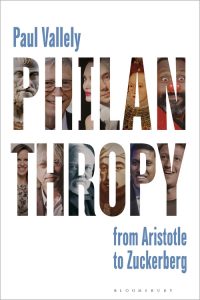Reviewed by David Cutler, Director, Baring Foundation.
 When reviewers normally refer to a book as ‘magisterial’, it is as a polite euphemism for an extremely long read. At 750 pages, Philanthropy is indeed a doorstop. But it is definitely an essential book for anyone interested in philanthropy with the necessary stamina.
When reviewers normally refer to a book as ‘magisterial’, it is as a polite euphemism for an extremely long read. At 750 pages, Philanthropy is indeed a doorstop. But it is definitely an essential book for anyone interested in philanthropy with the necessary stamina.
The author’s acknowledgements start with a reference to a commission from Sir Trevor Pears, a much-admired British philanthropist, on the grounds that there had been no ‘major history of English philanthropy written in the last half century’. Well I suppose it depends what you mean by ‘major’ but I have read several in the last couple of years. And this book is definitely not a history of English philanthropy but seeks to be a global account, albeit the second half is dominated by the giants of the industry in the US.
It is a book of two halves. The first section is a chronology from classical Greece up to the welfare state and beyond. The second deals with a series of key movements and debates in current philanthropy.
The historical section is a tour de force. Both comprehensive and brilliant on convincing explanation and telling detail, it describes with great clarity the influence of Greek and Roman philosophy before superb accounts of Judaism, Christianity and Islam. It is obvious that Vallely as a Catholic writer has a mission to set the record straight on the faith’s role in comparison to Protestantism; ‘The Great Myth of the Reformation’. And it is argued that Catholic thinking has had the answer in the relationship between private giving and the state, ‘Finding a New Balance’. Themes are repeated through the centuries, such as the deserving and underserving poor and whether charity can cleanse the donor. The prose is full of a rich tapestry of characters, often more memorable than today’s.
The second half of the book covers a range of important topics including the influence of celebrities, ‘philanthrocapitalism’ and effective altruism as a crude species of utilitarianism. Social impact investing is deemed full of potential. This section is strong on the negative effects of philanthropy on politics and democracy, but more could be said on race and colonialism and the need for ‘Decolonising Wealth’ – the title of another popular study. Also, far more could be said about contemporary philanthropy outside the US and UK.
The chapters are interspersed with interviews. These added little for me. They are mainly people at the Olympic heights of philanthropy through personal wealth or status as the leaders of enormous foundations. These are not only insiders, they are the elite of insiders. I found the eminently straightforward British ex-spy master Eliza Manningham Buller, outgoing chair of the Wellcome Trust, the most refreshingly modest.
Philanthropy displays its author’s strengths as a consummate journalist who tells the story in the most gripping way possible. Thankfully, it is not an academic text. His own concerns and networks though are also apparent, with an emphasis on the role of Catholicism and access to a cast of movers and shakers he has known through Live Aid and the Commission for Africa.
Vallely has written a book that will be a landmark for many years to come.
About the book:
Author: Paul Vallely
Published by Bloomsbury
Price (online): £27 hardback
ISBN: 9781472920126
To order: Bloomsbury.com



Comments (0)